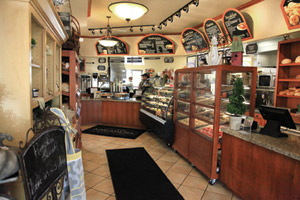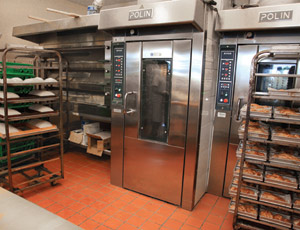When family-owned Kneaders Bakery and Café opened its first location in 1997, this part of the foodservice industry had not yet risen to the heights it enjoys today. That the fast-casual chain has not only persevered in the face of stiff national competition, but also continues to travel a growth path remains a testament to this concept's success.
 Kneaders Bakery and Cafe’s free-standing sites are 3,600 square feet, with the baking area, dining room and kitchen prep area each comprising a third of the square footage.According to Chicago research firm Technomic, the 23-store chain has experienced the most growth over the past year in the segment both in sales and unit volume for chains generating $20 million or more in annual revenue. In 2012, Kneaders' sales totaled $26 million, up more than 40 percent from the year prior. Unit growth was at more than 31 percent during this period. Franchisees run 18 of Kneaders' locations. The majority of Kneaders' locations are in Utah, with just three stores in Arizona and one in Idaho.
Kneaders Bakery and Cafe’s free-standing sites are 3,600 square feet, with the baking area, dining room and kitchen prep area each comprising a third of the square footage.According to Chicago research firm Technomic, the 23-store chain has experienced the most growth over the past year in the segment both in sales and unit volume for chains generating $20 million or more in annual revenue. In 2012, Kneaders' sales totaled $26 million, up more than 40 percent from the year prior. Unit growth was at more than 31 percent during this period. Franchisees run 18 of Kneaders' locations. The majority of Kneaders' locations are in Utah, with just three stores in Arizona and one in Idaho.
"The core of our business is on fresh foods, with a huge emphasis on providing a comfortable experience," says James Worthington, CEO. "We also place a high value on building customer, vendor and supplier relationships."
FE&S spoke with Worthington about how Kneaders has thrived in the increasingly competitive bakery café segment.
FE&S: What is the key to Kneaders' success in such a competitive segment?
JW: We've worked hard to get to where we can grow at an accelerated rate. We put great value in having a good system in place and using this to advance the business. From production to purchasing, we've developed procedures and then improved these along the way. It helps to have great support from our franchisees, who have allowed us to grow. A big part of this has been maintaining consistency. All of our sites are uniform, and consistency day to day and store to store is what we work hard at attaining.
FE&S: Describe your concept.
JW: Our freestanding sites are 3,600 square feet, with the baking area, dining room and kitchen prep area each comprising one-third of the square footage. We also have a drive-thru, which encompasses between 30 percent and 40 percent of our business. Catering accounts for between 5 percent and 10 percent of our business. Staffing ranges from 30 to 40 people, depending on the site, and may increase to as many as 50 during the holidays.
FE&S: What is the core of your menu?
JW: We offer artisan breads made from scratch, then build sandwiches on those breads. We make between 10 and 15 different types of bread daily. Our menu also includes salads, soups and between 30 and 40 different fresh pastries. A staple of our menu is slow-roasted hand-pulled turkey, which is one of our most popular offerings. Other best-sellers include raspberry bread pudding, éclairs, fruit tarts and artichoke portabella soup. We adapt our offerings to what customers want, and, since their tastes are always changing, we are constantly looking to add new items. Special attention is paid to seasonal ingredients and trends, so we regularly include limited-time offers. The more popular dishes end up on the permanent menu.
 Kneaders Bakery and Cafe creates its artisan bread from scratch on site.FE&S: How does your equipment support your operations?
Kneaders Bakery and Cafe creates its artisan bread from scratch on site.FE&S: How does your equipment support your operations?
JW: Locations include three to four large ovens for baking, bread mixers, planetary mixers, scales, a griddle in the kitchen area, sandwich makeup units and prep tables. We have walk-in coolers and freezers on an outside pad, in addition to small reach-in coolers in the kitchen area. Our ovens are imported from Italy. We used to utilize large deck-type ovens, but changed these over to smaller deck ovens that can be more easily accommodated in our stores.
FE&S: What is the most important consideration when purchasing equipment?
JW: Quality is the number-one consideration when specifying equipment. We've built relationships with equipment suppliers to ensure we're receiving units of the highest quality. We also need the support when equipment breaks down. It's inevitable that there are issues in this business, and we need to know our suppliers have our backs.
FE&S: Why do you think bakery cafés continue to grow in popularity?
JW: Bakery cafés are becoming more popular because people want good food that's healthier for them. We've also seen a big shift from sit-down service to fast casual because customers do not want to wait for their food.
FE&S: What are the biggest challenges bakery cafés face?
JW: The biggest challenge when making fresh product is maintaining consistency. Varying humidity levels and altitudes impact our production methods. For example, it can be difficult creating the same loaf of bread in Idaho that is prepared in Arizona. This is why creating the most effective systems is key to saving time and money, and ensuring equipment continues working well.
FE&S: What are Kneaders' plans moving forward?
JW: We are opening a site in Colorado Springs, beginning construction on a store in San Antonio and will add Arizona locations. Kneaders will be in five states next year. At some point, we would like to be a nationwide chain, but right now we're concentrating on staying west of the Mississippi.



